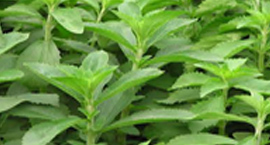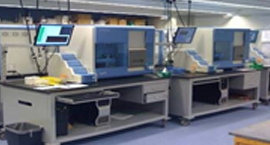
B2AS | Biotechnology, plant, health & food
Plant Breeding & Genetics

Plant breeding & genetics
Context

Plant breeding is playing an important role in the development of plant varieties for food and feed as well as for industrial uses such as fiber, fuel, shelter, and landscaping, in addition to eco-systems services and a variety of other human activities.
New varieties must meet current demands regarding yield, disease and pest resistance, quality characteristics, human health, salt or drought tolerance and suitability for sustainable plant production systems.
Plant breeding involves a variety of aspects, ranging from the molecular level and discovery and cloning of new genes to the population level and study of genetic diversity.
Aims of the pathway

In addition to fundamental knowledge, students will develop specific competencies in selected fields of Plant Breeding and Genetics such as gathering and studying germplasm, markers-based selection , inclusion of “omics” information and bioinformatics tools in selection strategies, and the integration of other biotechnologies such as gene-editing in selection strategies.
The specificity of the Plant Breeding and Genetics pathway is the need to specialize in plant genetics but also to develop wide-ranging knowledge of all fields of plant biology that relate to breeding, as well as the need to consider the plant as a whole and in interaction with its environment.
 Innovative and ambitious nature of the pathway
Innovative and ambitious nature of the pathway
The Plant Breeding and Genetics pathway is an international and integrated pathway. It is supported by a high-level research laboratory network in plant genetics in France and abroad and by a large number of private companies with important R&D laboratories.
Pathway organization and resources/Training program

It is specifically organized to let the students design their own programs consisting of three mandatory teaching units during the M1S2 and two elective units to be chosen from a list of elective TU. There are four mandatory TUs during the M2S1 and one elective TU to be chosen from a dedicated list.
From Year 2, the Plant Breeding and Genetics program is taught in English.and is enhanced by practical teaching, flipped classrooms and project based teaching is enhanced.
Many courses are delivered by researchers and professionnals.
First year, first semester (M1 S1)
All Teaching units are mandatory and common, see Program, Structure, Master 1
 First year, second semester (M1 S2)
First year, second semester (M1 S2)
The first year, second semester (M1 S2) is organized in the form of a first specific mandatory teaching unit (Plant Genetics, Genomics and Epigenetics) and two other TUs to be chosen from the elective list.
Students are recommended to design their training program to suit their professional projects and to develop competencies in complementary fields of Plant Breeding and Genetics. The training incorporates a two-month internship in Bordeaux or abroad that will give students their first experience of research.
| Name | Person in charge | ECTS | Language | Plant Breeding and Genetics |
|---|---|---|---|---|
| Plant Genetics, Genomics and Epigenetics | valerie.schurdi-levraud@u-bordeaux.fr | 6 | Fr | Mandatory |
| philippe.gallusci@u-bordeaux.fr | ||||
| English | jennifer.henry@u-bordeaux.fr | 3 | En | Mandatory |
| julien.consani@u-bordeaux.fr | ||||
| M1 internship - Communication tools | carine.ferrand@u-bordeaux.fr | 9 | Fr or En | Mandatory |
| martine.noubhani@u-bordeaux.fr | ||||
| Plant Biology and Biotechnologies | philippe.gallusci@u-bordeaux.fr | 6 | Fr | Elective |
| frederic.delmas@bordeaux.inra.fr | ||||
| jerome.joubes@u-bordeaux.fr | ||||
| Biodiversity of Plant Pathogenic and Symbiotic Microorganisms | gerard.barroso@u-bordeaux.fr | 6 | Fr | Elective |
| karine.dementhon@u-bordeaux.fr | ||||
| The Plant in its Environment : Biotic and Abiotic Stresses | eric.gomes@u-bordeaux.fr | 6 | Fr | Elective |
| virginie.laurent@u-bordeaux.fr | ||||
| Next Generations of Sequencing: Basics | sirand@bordeaux.inra.fr | 3 | Fr | Elective |
| patricia.thebault@labri.fr | ||||
| Next Generations of Sequencing: Applications | sirand@bordeaux.inra.fr | 3 | Fr | Elective |
The Second year, First semester (M2 S1)
The second year, first semester (M2 S1) is organized in order to provide two specific mandatory teaching units and one other TU to be chosen from the elective list. The Plant Breeding and Genetics pathway is taught in English.


